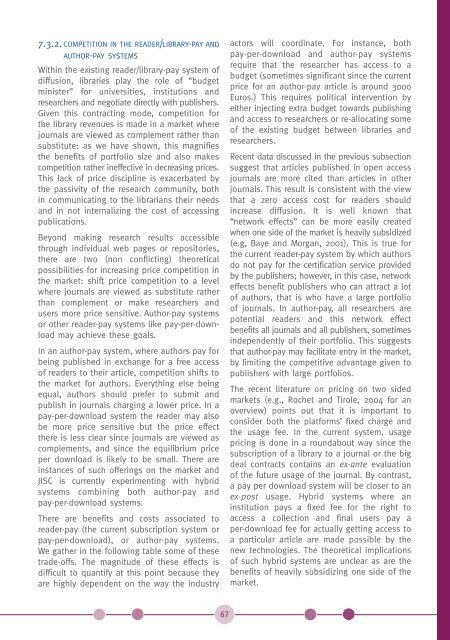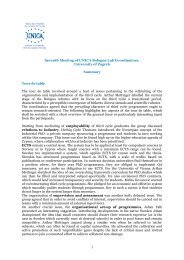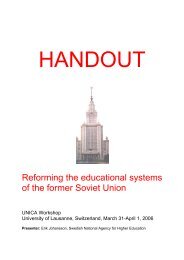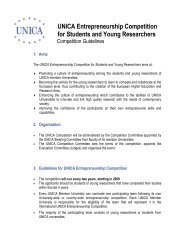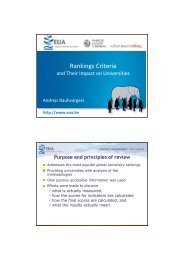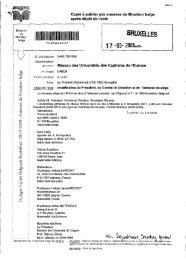Study on the economic and technical evolution of the scientific ...
Study on the economic and technical evolution of the scientific ...
Study on the economic and technical evolution of the scientific ...
You also want an ePaper? Increase the reach of your titles
YUMPU automatically turns print PDFs into web optimized ePapers that Google loves.
7.3.2. COMPETITION IN THE READER/LIBRARY-PAY AND<br />
AUTHOR-PAY SYSTEMS<br />
Within <strong>the</strong> existing reader/library-pay system <strong>of</strong><br />
diffusi<strong>on</strong>, libraries play <strong>the</strong> role <strong>of</strong> “budget<br />
minister” for universities, instituti<strong>on</strong>s <strong>and</strong><br />
researchers <strong>and</strong> negotiate directly with publishers.<br />
Given this c<strong>on</strong>tracting mode, competiti<strong>on</strong> for<br />
<strong>the</strong> library revenues is made in a market where<br />
journals are viewed as complement ra<strong>the</strong>r than<br />
substitute: as we have shown, this magnifies<br />
<strong>the</strong> benefits <strong>of</strong> portfolio size <strong>and</strong> also makes<br />
competiti<strong>on</strong> ra<strong>the</strong>r ineffective in decreasing prices.<br />
This lack <strong>of</strong> price discipline is exacerbated by<br />
<strong>the</strong> passivity <strong>of</strong> <strong>the</strong> research community, both<br />
in communicating to <strong>the</strong> librarians <strong>the</strong>ir needs<br />
<strong>and</strong> in not internalizing <strong>the</strong> cost <strong>of</strong> accessing<br />
publicati<strong>on</strong>s.<br />
Bey<strong>on</strong>d making research results accessible<br />
through individual web pages or repositories,<br />
<strong>the</strong>re are two (n<strong>on</strong> c<strong>on</strong>flicting) <strong>the</strong>oretical<br />
possibilities for increasing price competiti<strong>on</strong> in<br />
<strong>the</strong> market: shift price competiti<strong>on</strong> to a level<br />
where journals are viewed as substitute ra<strong>the</strong>r<br />
than complement or make researchers <strong>and</strong><br />
users more price sensitive. Author-pay systems<br />
or o<strong>the</strong>r reader-pay systems like pay-per-download<br />
may achieve <strong>the</strong>se goals.<br />
In an author-pay system, where authors pay for<br />
being published in exchange for a free access<br />
<strong>of</strong> readers to <strong>the</strong>ir article, competiti<strong>on</strong> shifts to<br />
<strong>the</strong> market for authors. Everything else being<br />
equal, authors should prefer to submit <strong>and</strong><br />
publish in journals charging a lower price. In a<br />
pay-per-download system <strong>the</strong> reader may also<br />
be more price sensitive but <strong>the</strong> price effect<br />
<strong>the</strong>re is less clear since journals are viewed as<br />
complements, <strong>and</strong> since <strong>the</strong> equilibrium price<br />
per download is likely to be small. There are<br />
instances <strong>of</strong> such <strong>of</strong>ferings <strong>on</strong> <strong>the</strong> market <strong>and</strong><br />
JISC is currently experimenting with hybrid<br />
systems combining both author-pay <strong>and</strong><br />
pay-per-download systems.<br />
There are benefits <strong>and</strong> costs associated to<br />
reader-pay (<strong>the</strong> current subscripti<strong>on</strong> system or<br />
pay-per-download), or author-pay systems.<br />
We ga<strong>the</strong>r in <strong>the</strong> following table some <strong>of</strong> <strong>the</strong>se<br />
trade-<strong>of</strong>fs. The magnitude <strong>of</strong> <strong>the</strong>se effects is<br />
difficult to quantify at this point because <strong>the</strong>y<br />
are highly dependent <strong>on</strong> <strong>the</strong> way <strong>the</strong> industry<br />
actors will coordinate. For instance, both<br />
pay-per-download <strong>and</strong> author-pay systems<br />
require that <strong>the</strong> researcher has access to a<br />
budget (sometimes significant since <strong>the</strong> current<br />
price for an author-pay article is around 3000<br />
Euros.) This requires political interventi<strong>on</strong> by<br />
ei<strong>the</strong>r injecting extra budget towards publishing<br />
<strong>and</strong> access to researchers or re-allocating some<br />
<strong>of</strong> <strong>the</strong> existing budget between libraries <strong>and</strong><br />
researchers.<br />
Recent data discussed in <strong>the</strong> previous subsecti<strong>on</strong><br />
suggest that articles published in open access<br />
journals are more cited than articles in o<strong>the</strong>r<br />
journals. This result is c<strong>on</strong>sistent with <strong>the</strong> view<br />
that a zero access cost for readers should<br />
increase diffusi<strong>on</strong>. It is well known that<br />
“network effects” can be more easily created<br />
when <strong>on</strong>e side <strong>of</strong> <strong>the</strong> market is heavily subsidized<br />
(e.g, Baye <strong>and</strong> Morgan, 2001). This is true for<br />
<strong>the</strong> current reader-pay system by which authors<br />
do not pay for <strong>the</strong> certificati<strong>on</strong> service provided<br />
by <strong>the</strong> publishers; however, in this case, network<br />
effects benefit publishers who can attract a lot<br />
<strong>of</strong> authors, that is who have a large portfolio<br />
<strong>of</strong> journals. In author-pay, all researchers are<br />
potential readers <strong>and</strong> this network effect<br />
benefits all journals <strong>and</strong> all publishers, sometimes<br />
independently <strong>of</strong> <strong>the</strong>ir portfolio. This suggests<br />
that author-pay may facilitate entry in <strong>the</strong> market,<br />
by limiting <strong>the</strong> competitive advantage given to<br />
publishers with large portfolios.<br />
The recent literature <strong>on</strong> pricing <strong>on</strong> two sided<br />
markets (e.g., Rochet <strong>and</strong> Tirole, 2004 for an<br />
overview) points out that it is important to<br />
c<strong>on</strong>sider both <strong>the</strong> platforms’ fixed charge <strong>and</strong><br />
<strong>the</strong> usage fee. In <strong>the</strong> current system, usage<br />
pricing is d<strong>on</strong>e in a roundabout way since <strong>the</strong><br />
subscripti<strong>on</strong> <strong>of</strong> a library to a journal or <strong>the</strong> big<br />
deal c<strong>on</strong>tracts c<strong>on</strong>tains an ex-ante evaluati<strong>on</strong><br />
<strong>of</strong> <strong>the</strong> future usage <strong>of</strong> <strong>the</strong> journal. By c<strong>on</strong>trast,<br />
a pay per download system will be closer to an<br />
ex-post usage. Hybrid systems where an<br />
instituti<strong>on</strong> pays a fixed fee for <strong>the</strong> right to<br />
access a collecti<strong>on</strong> <strong>and</strong> final users pay a<br />
per-download fee for actually getting access to<br />
a particular article are made possible by <strong>the</strong><br />
new technologies. The <strong>the</strong>oretical implicati<strong>on</strong>s<br />
<strong>of</strong> such hybrid systems are unclear as are <strong>the</strong><br />
benefits <strong>of</strong> heavily subsidizing <strong>on</strong>e side <strong>of</strong> <strong>the</strong><br />
market.<br />
67


